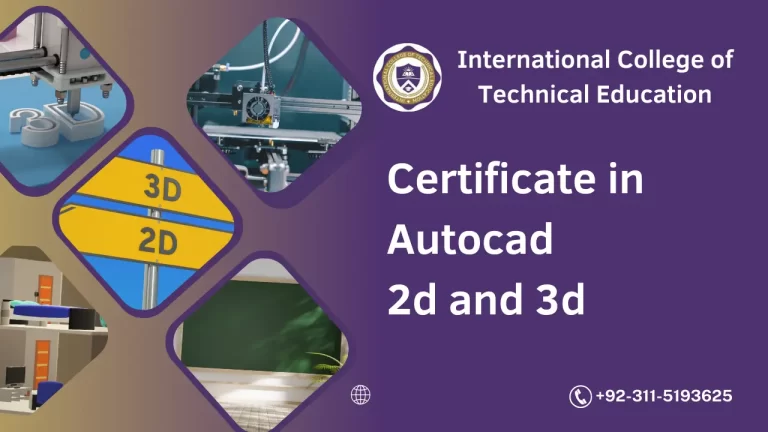The Quality Control (QC) Civil Course in Rawalpindi is designed to provide professionals and enthusiasts with essential skills and knowledge to ensure the highest standards in civil construction projects. Quality control in civil engineering is crucial for ensuring the safety, durability, and compliance of structures with industry standards. This course is perfect for those looking to develop expertise in maintaining and enhancing quality in the construction industry, ensuring that projects meet regulatory requirements and industry best practices.
Whether you are new to the field or looking to further your career, the Quality Control Civil Course offers a comprehensive approach to understanding quality management systems, materials testing, site inspections, and quality assurance in civil engineering.
Course Overview
The Quality Control Civil Course in Rawalpindi provides a detailed understanding of quality control systems used in civil engineering projects, including construction materials, on-site testing, safety regulations, and effective project management. The course covers both theoretical and practical aspects of civil quality control, equipping students with the tools needed to monitor, manage, and enhance the quality of construction projects from start to finish.
Participants will learn the importance of quality control in the construction industry, how to implement effective QC measures, conduct material testing, assess construction work for compliance, and troubleshoot common quality issues in civil engineering projects.
Learning Outcomes
Upon successful completion of the Quality Control Civil Course in Rawalpindi, students will be able to:
- Understand Quality Control in Civil Engineering: Gain an in-depth understanding of the importance of quality control in civil engineering and construction projects, including the role of QC in maintaining safety and durability.
- Implement QC Systems: Learn how to design and implement quality control systems that ensure the construction project adheres to regulatory standards and industry guidelines.
- Conduct Material Testing: Understand how to perform essential material testing, including soil, concrete, and steel testing, and how these tests impact project quality.
- Perform Site Inspections: Develop the ability to inspect construction sites for quality compliance, ensuring materials and workmanship meet project specifications.
- Analyze Construction Drawings and Specifications: Learn how to analyze and interpret construction drawings, plans, and specifications to ensure they align with quality control measures.
- Utilize Quality Control Tools and Techniques: Become proficient in using common QC tools, including checklists, measurement equipment, and testing methods, to monitor and maintain construction quality.
- Ensure Compliance with Standards: Gain a solid understanding of local and international construction quality standards, including ISO and ASTM standards, and how to ensure project compliance.
- Troubleshoot Quality Issues: Learn how to identify potential quality issues in construction projects and apply corrective actions to mitigate risks and improve overall quality.
Study Units
The Quality Control Civil Course in Rawalpindi is structured to cover a variety of critical topics relevant to civil engineering and construction quality management:
- Introduction to Quality Control in Civil Engineering: Understand the core concepts of quality control, its importance in civil engineering, and the role of QC in construction management.
- Construction Materials and Testing: Learn about the various materials used in civil construction, including concrete, soil, steel, and aggregates, and the different tests required to evaluate their quality.
- Site Inspection and Monitoring: Develop skills in performing on-site inspections to monitor quality during construction, identify deviations, and ensure compliance with project specifications.
- QC in Concrete and Steel Construction: Focus on quality control procedures specific to concrete and steel structures, including tests for compressive strength, slump tests, and steel reinforcement checks.
- Quality Control in Project Management: Study how QC integrates into overall project management, including planning, scheduling, resource management, and quality assurance.
- Construction Safety and Compliance: Gain knowledge of safety standards and regulations to ensure the health and safety of workers while maintaining quality in construction projects.
- ISO and Other Quality Standards: Learn about international quality standards like ISO 9001, ASTM, and other regulatory requirements relevant to construction projects.
- Problem-Solving and Troubleshooting in QC: Learn how to identify common quality issues in construction and implement effective solutions to prevent defects, delays, and cost overruns.
- Case Studies and Real-World Applications: Engage in practical exercises and case studies to understand the application of QC principles in real-world civil engineering and construction projects.
Course Benefits
The Quality Control Civil Course in Rawalpindi offers numerous advantages for individuals pursuing a career in civil engineering or looking to enhance their existing skills:
- Industry-Relevant Knowledge: Gain in-depth knowledge of quality control in civil engineering and construction, preparing you to manage projects and ensure they meet quality standards.
- Enhanced Career Opportunities: The demand for skilled QC professionals in the construction industry is high. Completing this course opens up opportunities in project management, site supervision, and quality assurance roles.
- Practical Skills for Immediate Application: Learn practical skills that can be applied directly to real-world construction projects, including material testing, site inspections, and compliance monitoring.
- Improved Project Outcomes: Master the tools and techniques required to improve the quality, safety, and efficiency of construction projects, leading to better outcomes and fewer issues on-site.
- Global Relevance: This course covers international standards and practices, ensuring that students are prepared to work on global construction projects or with international organizations.
- Certification: Upon completion, students will receive a certificate that demonstrates their proficiency in civil quality control, which can enhance employability and career growth.
- Networking Opportunities: Engage with professionals in the construction industry, providing valuable networking opportunities that can help with job placement and career advancement.
- Increased Confidence in Quality Management: Equip yourself with the knowledge and skills to confidently manage quality control efforts on civil construction projects, reducing risks and improving performance.
Who is This Course For?
The Quality Control Civil Course in Rawalpindi is ideal for individuals looking to develop a career in civil engineering, construction, or project management. This course is well-suited for:
- Aspiring Civil Engineers: Students or new graduates in civil engineering who wish to specialize in quality control and improve their job prospects in the construction sector.
- Construction Professionals: Professionals working in construction roles, such as site engineers, supervisors, and foremen, who want to enhance their knowledge of quality control procedures and practices.
- Project Managers: Construction project managers looking to integrate effective quality control systems into their projects and improve project outcomes.
- Quality Control Inspectors: Individuals who want to specialize in quality control inspections and testing for civil engineering projects.
- Contractors and Subcontractors: Business owners and managers in construction firms who wish to ensure their projects comply with quality control standards and regulations.
- Technicians and Laborers: Construction workers seeking to upskill and gain expertise in quality control methods, improving their career prospects in the industry.
- Entrepreneurs in the Construction Industry: Those looking to start their own construction business and wanting to ensure the delivery of high-quality services and projects.
The Quality Control Civil Course in Rawalpindi is an essential training program for anyone interested in ensuring high standards of quality, safety, and compliance in civil engineering and construction projects. With a comprehensive curriculum covering everything from material testing to site inspections and regulatory compliance, this course provides the knowledge and skills necessary to excel in the construction industry.
Whether you are new to the field or looking to enhance your expertise, this course equips you with the tools to manage quality control processes effectively, ensuring that projects are completed safely, on time, and within budget.
Enroll today in the Quality Control Civil Course in Rawalpindi and take the first step toward a rewarding career in construction quality management!







